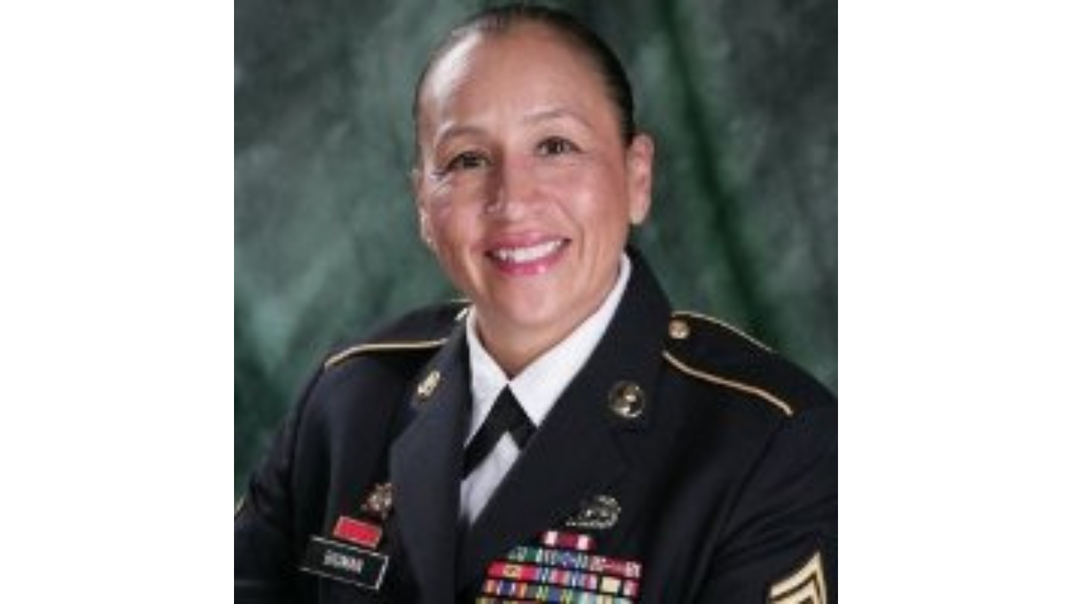NATIONAL MUSEUM OF THE AMERICAN INDIAN
National Women’s History Month: Mitchelene BigMan
An interview with Native American Veteran Mitchelene BigMan.
/https://tf-cmsv2-smithsonianmag-media.s3.amazonaws.com/blogging/featured/Mitchelene_blue_background)
“As a soldier, we are trained not to think we are women … Those soldiers relied on me, expected that I would bring them home safe.” – Mitchelene BigMan
To highlight National Women’s History Month we Mitchelene BigMan, the founder of the Native American Women Warriors (NAWW) who are recognized as the United States first organized all-female Native color guard. The NAWW was founded in 2010, by Mitchelene, a 22-year Army veteran who served in Germany, Korea and two tours in Iraq before retiring as a Sergeant First Class in 2009. NAWW’s mission is to bring attention to and honor the contributions of Native American women’s military service. They have served as color guard at many notable events across the country, including President Barack Obama’s second inauguration. Her advocacy for Native American Women Veterans earned her the Society of American Indian Government Employees award. She also serves on the advisory committee for the Smithsonian's National Native American Veterans Memorial.

Thank you for giving us this interview. Please introduce yourself and if it is appropriate share your Native name and what it means.
What is your name?
Mitchelene BigMan
Can you give us your Native name, its English translation and/or nickname?
One that speaks with a kind word
What tribe are you?
Crow
Where are you from?
Lodge Grass, Montana
Is the warrior culture strong in your family and/or tribe?
Yes
Did any of your family members also serve? If so who?
Both grandfathers, grandmother, most of my uncles on my father’s side.
Why did you choose to serve in the armed forces?
Living on the reservation there was limited resources for employment. Domestic violence was too high.
Did your Native background play any part in your decision to join?
No
Why did you enter your specific branch of the military?
Wanted to go Marines first, but I had to wait a year. I had to leave right away, so they sent me to the Army.
What years did you serve and where did you serve?
1987-2009; Germany, Iraq, Korea and four stateside duty stations.
What was the highest rank you received?
Sergeant First Class/E-7
Were there other Natives who served with you and would you care to talk about them?
I did come across a few during my tenure, being a male dominant field it was rare to find Native women in service.
Were you treated differently in the service because you are Native? Yes. If so please explain.
I was had to deal with disparate treatment, called names, mocked and wasn’t given opportunities like my fellow female service members who were either; Hispanic, White, Asian or Black.
Can you please share a story or incident that sticks out the most in your mind about your service?
Sexual Assault
Where were you when your service ended?
Fort Carson, Colorado
Did your tribe or Native community do anything special for you upon your return home when your service ended?
Not really, but did when I returned from war.
Are you a member of any veterans group(s)?
Native American Women Warriors
Would you recommend joining the service to your family members or others of your tribe?
Not really
What do you think of the upcoming Native American Veteran’s Memorial?
I am excited and look forward to working along with NMAI until the day of unveiling.
Is there anything else you would like to add?
This memorial I hope is inclusive to both male and female.
Highlighting Native Americans' extraordinary records of service in the United States Armed Forces is important to the National Museum of the American Indian's goal of promoting a more complete and accurate understanding of American history and contemporary Native American lives. In 2013, Congress passed legislation authorizing the museum to create the National Native American Veterans Memorial (NNAVM) to give “all Americans the opportunity to learn of the proud and courageous tradition of service of Native Americans in the Armed Forces of the United States." The memorial opened on November 11, 2020 and is open 24 hours a day, unless safety considerations require it to be closed. Before planning your visit, please consult https://washington.org/dc-information/coronavirus-travel-update-washington-dc.
